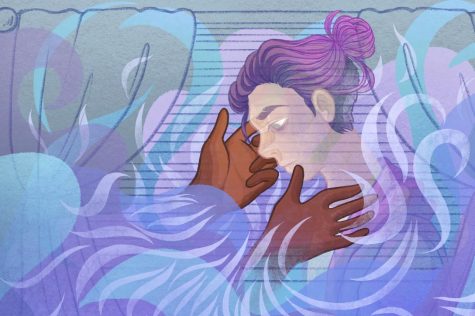Column: During Mental Health Awareness Month and beyond, check in on quarantined loved ones
May 12, 2020

Alissa Swatkowski’s pet geese are fighting, and that’s stressing her out. But that’s not her biggest stressor during the spring semester. Because of growing coronavirus concerns and stay-at-home orders, Swatkowski, a senior filmmaking major, is also dealing with heightened depression and anxiety.
“I have been torn apart from my support system,” Swatkowski said. “Not that my parents aren’t supportive, but … it’s also a different vibe in general when you’re with roommates and friends versus being at home.”
Swatkowski was my roommate at The Arc—one of Columbia’s on-campus residence halls—before dorms were vacated and closed. Since then, we still keep in touch, and I’m able to have insight into her challenges during this time—but she is not alone.
People with mental health disorders everywhere are being affected by quarantine, and this includes our friends, family and significant others. Given that May is Mental Health Awareness Month, we owe it to those close to us to take into account the likelihood that the mental health disorders they live with daily may be heightened during a global pandemic.
Christine Caputo—counselor and owner of Mindset Counseling in Oswego, Illinois, who is also my aunt—treats patients via telehealth, or online therapy appointments, during quarantine from her children’s toy room.
As a specialist in anxiety, she doesn’t like to use the word “disability” for mental disorders, though she understands they technically can be, under the right circumstances, according to the Americans with Disabilities Act. She opts instead for terms such as “disabling” or “debilitating.”
Caputo said people who are debilitated by their mental health use “pillars” to stand their lives on, like jobs, friends and school. But now, those pillars are being knocked down, and she is seeing a rise in self-injury and suicidal thoughts, along with “a lot of pot smoking.”
Caputo said that therapists, especially now, are hearing a lot of similarities between patients, which can be just as draining for mental health professionals. Phrases like, “I’m anxious; I don’t know what’s going to happen” or “I don’t like being at home,” are among some of the common responses from people she works with.
“It’s a collective trauma, … a global, collective trauma,” she said. “We’re all experiencing the same form of trauma. Trauma is anything that changes your life, anything that, afterward, you’re different. … Our emotional immune systems are down.”
Stuck in quarantine, my friend Emerson Roden is having to rearrange their schedule and find new coping mechanisms for their online classes at Illinois Valley Community College.
Because they have Attention-Deficit/Hyperactivity Disorder, they also struggle with “time blindness,” a side effect of ADHD in which the person does not understand what it is like for a minute to pass. Therefore, they are using daily bulleted lists to maintain time awareness.
“Being at home has taken away the big routine of my coping strategy,” Roden said. “[Now] I give myself a little bit of a schedule—not necessarily exact times—but I’ve coped [by keeping] my paper planner on my right.”
Not only during the month of May but all months, check in on people who you know are dealing with disabilities, whether they be mental or physical. We’re all drained right now, stuck in our homes and learning how to cope with a pandemic, but reaching out to people can be beneficial for both the caller and the receiver.
The Centers for Disease Control and Prevention also advises taking breaks from the news and social media, along with meditating, eating healthy food, exercising, sleeping regularly, avoiding alcohol and drugs, and finding time to unwind and connect with others during this stressful time.
“Keep your friends close by,” Swatkowski said. Whether it be via text or something similar to keep from isolating yourself in a time when we all need our loved ones.







